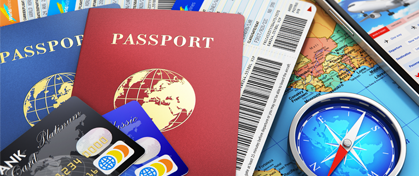 Back
Back
Should You Take Your Credit Card On Holiday?
On Monday, June 13, 2022 -
To take your credit card on holiday, or not to take it? That is the question.
Deciding whether to leave your credit card at home or not when you go on holiday can present a conundrum for some. After all, there are advantages and drawbacks whatever you decide.
We’ll take you through some of the questions people ask about taking their credit card on holiday. Then, you can decide what to do with confidence.
Is it better to take cash or card on holiday?
We think you should take both. Only having one or the other could leave you in a sticky spot if something went wrong. For example, if your credit card stopped working and this was your only means of paying for things, you’d be a bit stuck. But if you had cash as well, you could use that while you sorted your card out.
Or, if you had cash in your pocket and it did a disappearing act, you could be penniless for the rest of your holiday. Lost or stolen cash is notoriously difficult to get back. However, having your credit card in your wallet gives you a useful fallback plan in case of emergencies.
Taking both cash and a credit card on holiday also means that you can choose how you pay for different things. Spending on a credit card comes with the additional protection offered by Section 75 of the Consumer Credit Act (as long as each item you’re buying costs over £100 but not more than £30,000), but we’ll talk about this a bit more later.
Choosing to use your card for pricier purchases on your trip, like car hire, day trips or watersports, means you’ve got that extra protection when it counts most. And, this keeps your cash available to cover smaller costs like souvenirs, a novelty pool float, or treating yourself to a delicious gelato.
Where can I use a credit card abroad?
These days, most countries and venues around the world accept card payments. So, you should be able to use your credit card pretty much anywhere you’d use it at home – in supermarkets, restaurants, to pay for attractions or day trips, you name it. That said, cash is still a popular payment method for some things, like taxis. And, you may come across the odd shop or café that doesn’t take card payments, too. So, it’s best not to assume you can use your credit card absolutely everywhere, and cover all your bases.
Do I need to tell my credit card provider before I travel?
Ideally, yes. Credit card providers should all have measures in place to protect you against fraud. These can include freezing your card if they spot an unusual transaction. And, unusual is exactly what using your card abroad could be. By giving your card provider a quick call to tell them you’re going on holiday and when, you could avoid them flagging your holiday spending as “suspicious” and putting your card temporarily out of action.
Top tip: Make a written note of your credit card provider’s phone number and keep it with your holiday documents or in another easy-to-find place. This way, if your card does get frozen while you’re away, or if it gets lost or stolen, you’ll be able to find their details quickly and jump straight into action to get it sorted.
Will I have to pay extra fees to use my credit card abroad?
Probably, yes. Many credit card providers charge what’s known as a “non-sterling transaction fee” when you use your credit card to spend or withdraw cash in a foreign currency. This fee will usually be added to each foreign purchase you make, so whatever you’re spending, remember that it’ll cost a little bit more than it seems at the time.
Card providers all set their own fees for using your card abroad. So, to check what you’d be charged, you’ll need to take a look at your credit agreement or speak to your card provider. Typically, this type of fee is about 3%, although some credit card companies may charge more, and others may not charge these fees at all.
Should I pay in sterling or the local currency?
You might wonder why you’d have to make this choice. But perhaps surprisingly, it is an option on many card machines you might encounter while abroad. There are a few things to consider when deciding whether to pay in the local currency or in sterling, such as:
- the exchange rate being offered for each currency
- any fees you may be charged by your card provider.
While you could attempt to work out which is cheaper on the fly, this would mean doing some tricky sums (no thanks)!
A good rule of thumb to follow is that if you choose to pay in sterling, the exchange rate will be worked out by the company you’re spending with. However, if you pay in the local currency, the exchange rate will be worked out by your card issuer, (VISA, Mastercard, etc.). Generally, card issuer exchange rates are much better, and so even with transaction fees in the mix, it’s usually cheaper to pay in the local currency.
Can I use my credit card to withdraw cash on holiday?
Yes, you can. However, using your credit card to get extra cash out of an ATM isn’t advisable, either at home or abroad. This is because withdrawing cash using a credit card can come with hefty “handling” fees. When you’re abroad, you may also have to pay transaction fees for spending in a foreign currency – on top of handling fees. So, it can become very expensive, very quickly.
Using a debit card to withdraw cash while you’re abroad might be cheaper in terms of fees, so could be a better option if you need to use an ATM. Before you travel, make sure you check what fees your different credit and debit card providers charge, so you can make the most cost-efficient choices while you’re away.
Does Section 75 still protect me abroad?
Yes, it does. As long as your credit card was issued in the UK, then the protection offered by Section 75 still applies, even if the purchase you need to claim for was made abroad.
In case you need a recap, Section 75 of the Consumer Credit Act is the law that governs how certain types of credit agreements should be conducted. In a nutshell, Section 75 lays out extra protection that kicks in when:
- you buy something that costs over £100 but no more than £30,000 on your credit card
- you’ve suffered a “breach or misrepresentation of contract” with the item you bought. For example, if it arrived broken, never turned up, or was different to the product described.
- you’ve already tried to get your money back but have been unsuccessful, for example because the company has gone bust.
On holiday, an example of when you may be able to claim under Section 75 could be if you booked a day trip that was cancelled by the tour operator, but they won’t refund you the cost, or have mysteriously vanished and you can’t get hold of them.
Remember though, Section 75 won’t protect you if:
- even though your transaction totals £100 or more, it’s made up of smaller items that cost less. The individual item you’re claiming for must have cost at least £100 (but no more than £30,000) for Section 75 to kick in
- you used your credit card to withdraw cash that you then used to make the purchase you want to claim on. There must be a direct link between your credit card and the purchase for Section 75 to protect you
- your purchase is faulty but is still under warranty and the fault would be covered by that. In this situation, you’ll need to contact the manufacturer directly
What are the alternatives to using a credit card abroad?
If you aren’t keen on using your credit card abroad, then these are your other options:
Debit cards
You can use the debit card linked to your bank account in much the same way as a credit card while abroad, and with the same considerations. So, remember to tell your bank before you travel if you plan to use your debit card abroad. And, look up what (if any) fees you’ll be charged for spending or withdrawing cash in a foreign currency.
However, if you use your debit card abroad, your purchases won’t be covered by Section 75, as this only applies to credit cards.
Pre-paid travel cards
Pre-paid travel cards are brilliant if you want to be able to pay by card while you’re on holiday and don’t want to risk taking your usual credit or debit card. You simply load them up with money before you leave for your holiday, and you’re away. Some pre-paid card providers still charge transaction fees when you use them abroad. So, make sure you look for a pre-paid card that’s specifically for travelling to keep fees to a minimum, if they’re charged at all.
It's worth bearing in mind that, of course, when you use a pre-paid card, you can only spend what you’ve loaded onto the card, and once it’s gone, it’s gone. So, consider how you’d top up the card if you needed to whether that means taking extra cash, or your debit card or credit card.
Cash
We’ve touched on why we don’t think it’s a great idea to only take cash on holiday, but of course it is still an option if all things considered, it’s what you prefer to do. If you do go down this route, then consider these tips:
- set yourself a daily budget to pace your spending
- only carry the cash you think you’ll need immediately, not everything you have
- keep the rest of your cash securely in your accommodation – in a safe, for example










